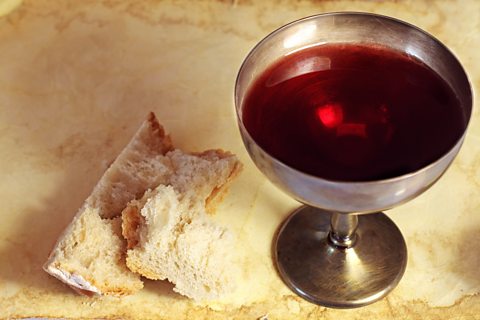Communion
Communion, also known as the LordÔÇÖs Supper or the breaking of bread, comes from the Last SupperThe meal that Jesus had with his disciples the night before he died where he gave them bread and wine to symbolise his body and blood. which Jesus celebrated with his disciples before he was crucifixionRoman method of execution by nailing someone to a cross, often until they die of asphyxiation; used on Jesus and many others..
During this PassoverJewish festival which remembers the escape of the ancient Israelites from Egypt. meal, Jesus gave new meaning to the Passover festival by adding two main elements:
- bread representing JesusÔÇÖ body
- wine representing JesusÔÇÖ blood

Jesus took bread, gave thanks and broke it, and gave it to his disciples, saying, ÔÇ£Take and eat; this is my body." Then he took the cup, gave thanks and offered it to them, saying, "Drink from it, all of you. This is my blood of the covenant, which is poured out for many for the forgiveness of sins.
Jesus commanded his followers to celebrate communion after he left them as an act of remembrance, thanksgiving and to celebrate the sacrifice he had made for them.
Do this in remembrance of meFor whenever you eat this bread and drink this cup, you proclaim the Lords death until he comes.
Who takes communion?
In the Baptist Church they have an open table so anyone who knows Jesus as their saviour can take communion. You do not have to be a Baptist.
In the Presbyterian Church anyone can take communion who is a Christian. Traditionally, children do not attend until they have communicantA person who receives Holy Communion. classes to teach them about communionÔÇÖs importance. Those who attend usually present communion tokens to indicate they are present. This helps elders to keep track of those who do not attend and who may be experiencing problems.
How often is communion celebrated?
In the Baptist Church communion is celebrated every Sunday, usually at the end of the service.
In the Presbyterian Church and the Church of Ireland communion is usually celebrated between four and twelve times a year. This is to encourage people to think about the seriousness of communion.
Most Christians believe that communion is a sacrament An outward sign of an invisible and inward blessing by God, for example, baptism and Eucharist. which feeds them spiritually. They celebrate it to:
- obey ChristÔÇÖs command
- remember his death
- give thanks for forgiveness
- celebrate the resurrectionThe rising of Christ from the dead, three days after the crucifixion.
- have fellowship with Christ
- have fellowship with each other
- identify with ChristÔÇÖs death and resurrection
- show they believe in Christ
- be built up spiritually
- publicly declare their faith
- look forward to ChristÔÇÖs return
- show that an old way of life in them has died and a new one has been raised
Order of service in a Baptist church
Usually communion will follow the main Sunday morning service.
The pastorA religious leader in certain Protestant churches. will usually read a passage from the Bible (perhaps the story of the Last SupperThe meal that Jesus had with his disciples the night before he died where he gave them bread and wine to symbolise his body and blood.) and will remind Christians of the seriousness of taking communion.
The pastor will explain that communion is an act of thanksgiving and remembrance and that it looks forward to JesusÔÇÖ return.
Usually someone will pray to give thanks for the bread that reminds Christians of JesusÔÇÖ body, and then someone will pray to give thanks for the wine which reminds Christians of JesusÔÇÖ blood.
The pastor will often recite the words from 1 Corinthians:
The Lord Jesus, on the night he was betrayed, took bread, and when he had given thanks, he broke it and said, ÔÇ£This is my body, which is for you; do this in remembrance of me.ÔÇØ In the same way, after supper he took the cup, saying, ÔÇ£This cup is the new covenant in my blood; do this, whenever you drink it, in remembrance of me.ÔÇØ
The bread is passed around first followed by the wine. The congregation remain in their seats and the elements are served by the deacons (church leaders).
This part of the service will end with a song and a prayer.